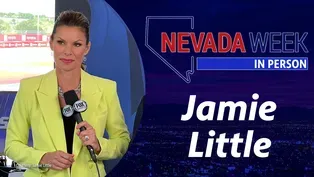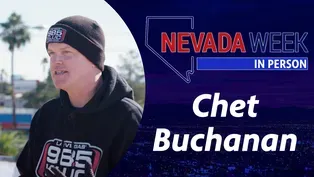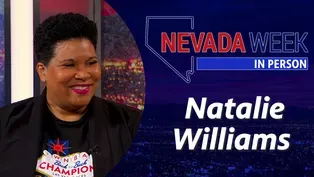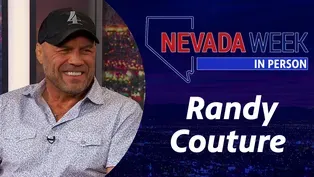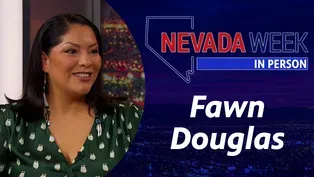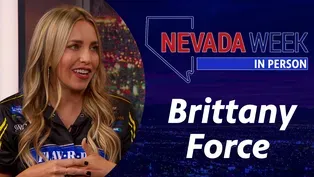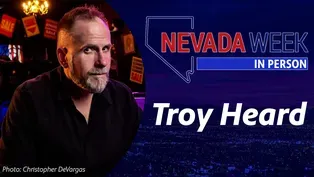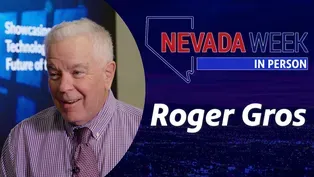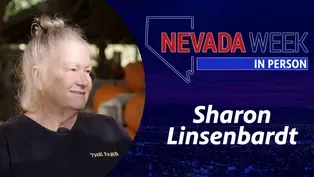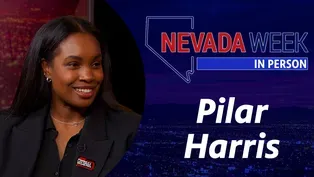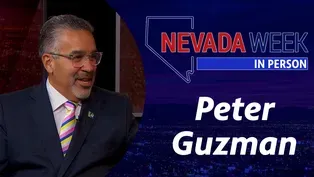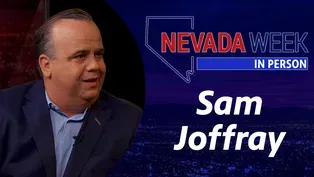
Nevada Week In Person | Stephanie Castellone
Season 1 Episode 79 | 14mVideo has Closed Captions
One-on-one interview with Stephanie Castellone, CEO, Director & Administrator, BurlyCares
One-on-one interview with Stephanie Castellone, CEO, Director & Administrator, BurlyCares
Problems with Closed Captions? Closed Captioning Feedback
Problems with Closed Captions? Closed Captioning Feedback
Nevada Week In Person is a local public television program presented by Vegas PBS

Nevada Week In Person | Stephanie Castellone
Season 1 Episode 79 | 14mVideo has Closed Captions
One-on-one interview with Stephanie Castellone, CEO, Director & Administrator, BurlyCares
Problems with Closed Captions? Closed Captioning Feedback
How to Watch Nevada Week In Person
Nevada Week In Person is available to stream on pbs.org and the free PBS App, available on iPhone, Apple TV, Android TV, Android smartphones, Amazon Fire TV, Amazon Fire Tablet, Roku, Samsung Smart TV, and Vizio.
Providing Support for PBS.org
Learn Moreabout PBS online sponsorshipMore from This Collection
Nevada Week In Person | Jamie Little
Video has Closed Captions
One-on-one interview with Jamie Little, NASCAR Broadcaster (14m)
Nevada Week In Person | Chet Buchanan
Video has Closed Captions
One-on-one interview with Chet Buchanan,Host & Creator, 98.5 KLUC’s The Chet Buchanan Show (14m)
Nevada Week In Person | Natalie Williams
Video has Closed Captions
One-on-one interview with Natalie Williams, General Manager, Las Vegas Aces (14m)
Nevada Week In Person | Randy Couture
Video has Closed Captions
One-on-one interview with Randy Couture, UFC Hall of Famer & U.S. Army Veteran (14m)
Nevada Week In Person | Fawn Douglas
Video has Closed Captions
One-on-one interview with Fawn Douglas, Artist and Activist, Nuwu Art (14m)
Nevada Week In Person | Brittany Force
Video has Closed Captions
One-on-one interview with Brittany Force, World Champion Drag Racer (14m)
Nevada Week In Person | Troy Heard
Video has Closed Captions
One-on-one interview with Troy Heard, Artistic Director, Majestic Repertory Theatre (14m)
Nevada Week In Person | Roger Gros
Video has Closed Captions
One-on-one interview with Roger Gros, Publisher, Global Gaming Business Magazine (14m)
Video has Closed Captions
One-on-one interview with Sharon Linsenbardt, Owner, Las Vegas Farm and Barn Buddies Rescu (14m)
Nevada Week In Person | Pilar Harris
Video has Closed Captions
One-on-one interview with Pilar Harris (14m)
Nevada Week In Person | Peter Guzman
Video has Closed Captions
One-on-one interview with Latin Chamber of Commerce Nevada President & CEO Peter Guzman (14m)
Nevada Week In Person | Sam Joffray
Video has Closed Captions
One-on-one interview with Sam Joffray, President & CEO, Las Vegas Super Bowl LVII Host Com (14m)
Providing Support for PBS.org
Learn Moreabout PBS online sponsorshipA contortionist, registered nurse, end-of-life doula, and nonprofit CEO, Stephanie Castellone is our guest this week on Nevada Week In Person.
♪♪♪ Support for Nevada Week In Person is provided by Senator William H. Hernstadt.
Welcome to Nevada Week In Person.
I'm Amber Renee Dixon.
Using her experience as a circus performer and hospice nurse, she started a unique nonprofit helping senior variety show performers.
Stephanie Castellone, CEO of BurlyCares, thank you for joining Nevada Week In Person.
(Stephanie Castellone) Thank you for having me.
-So BurlyCares, "burly," being short for burlesque.
-Yes.
-What happened that made you say this kind of nonprofit is needed in Las Vegas?
-I honestly think it was a slowing down during the pandemic, when everything shut down.
I became closer with some of the burlesque, we call them legends or senior, senior performers in town, during that time.
One in particular was in the dying process--not due to COVID, but just from natural, you know, disease processes--who I had known for a really long time.
And we had a pretty close relationship.
And she was the one to really actually school me in that this is very much a need.
This is a whole population of people.
And she was, I know you know, but this is the population that's going to need help very much so in the next, you know, few years.
And she was very much correct.
-So in what ways are they needing help?
-From anything from fundraising for basic life necessities to assistance, like you know, minor assistance in the house with maybe some chores or errands.
But really by and large as someone declines, this population very much is in need of assistance with declining, because they're so used to being physical all the time and being performers or being "on."
And so as they're declining in the natural, you know, process of life and with the human body, having somebody like BurlyCares or an organization like BurlyCares is phenomenal for them to kind of really hold their hand and say it's gonna be okay.
We're gonna get through this together, and you're not going to be alone.
-And you're specifically, I think, talking about the end-of-life doula services-- -Yes.
- --that you provide.
What is an end-of-life doula?
-End-of-life doula is very similar to a hospice volunteer.
In fact, my specialty in nursing for many years is hospice.
And so when end-of-life doula came on the map as a term, it was funny because I just had to take a step back.
I said that-- a hospice volunteer, we have a whole-- we used to have a whole division of volunteers.
Each hospice has to have one.
So when the term came out, I thought, okay, but this is really nice because at least it's giving a terminology to a very needed part of hospice, which is volunteer services.
But the end-of-life doulas do a little bit more, and more comprehensive in that they are there for the family.
They'll say to the family member, you know what?
Why don't you go take a nap.
You can set your alarm.
I'll be here with your loved one.
And then you get some rest.
You know, that's the sort of thing that's more concise.
A volunteer in hospice might come in, spend a little bit of time, read a book, and then leave.
But with an end-of-life death doula, it's a little bit more concise.
There's a little bit more of like, I would say a care plan in place for that person in what they're doing specifically with the patient.
-To help a person pass.
-To help a person.
-You told Las Vegas Weekly that you have found a, quote, "profound love with helping people pass."
-Yes.
-What is it about that process that's drawn you so much?
-It's very much my belief that one of the best things and one of the most honorable and amazing things you can do is to bring someone home.
And by home, I mean "the home."
You know, the proverbial, the real home, as I say it.
It's an honor.
It's very similar to a birth.
And it's my belief that it's not the end at all and it's very much a transition.
So it's an honor.
It's an absolute honor.
-And there are birthing doulas.
-Yes.
-Right.
-Asolutely.
-So that's the start of life.
This is the-- -Which I've done a few times.
-Okay.
Another talent that you have.
-I wouldn't say I am by any means proficient, but I've helped a few friends with birthing, yes.
-You talked about the proverbial home.
And I'm wondering when you think about starting BurlyCares, is there anyone better than you to have started this?
Do you believe in destiny?
-Very much so.
And it was, it was really ironic as it was coming to fruition with the, with that legend in particular that I spoke about.
There was a moment where it really did hit me, you know.
And she said it, as well.
She's like, sweetheart, who else better?
I mean, you have 20-plus years' experience.
There's no one else in the community that has 20-plus years specifically in hospice.
And so I, you know, I thought about it.
She's very much correct.
And this is very much destiny, because what was happening in my own life at the time was very much in congruence with, yes, I can do this now.
Especially with things being shut down.
-Yeah.
It allowed you that time.
-That time.
-I think some viewers might be wondering, well, why these performers versus just older adults, in general?
Why might they need this service more than others?
-It's a good question.
Our population is very-- most of us are very much extroverts.
And we love to be with people.
And we love to entertain.
And we love to keep a-- socialization is very important for this population.
I would say much more than the average person.
Most of us thrive on each other and being together.
And so if they don't have that in place as they're declining, it becomes much more of an issue, and it even plays into increased pain, increased anxiety, for sure, increased depression.
So if things like an end-of-life doula is in place, or a community of people are in place, or as I call "my team" for each kind of, you know, individual legend, that really decreases the amount of anxiety, depression, and pain.
-Wow!
And that is for the end of life.
But also you're providing services to combat isolation-- -Yes.
- --while these legends are still active.
-Yes, absolutely.
-How so?
-We do.
We host several different things in the community.
We put on shows, because that's what we do.
-Yeah.
-So we're all pretty proficient in that.
And we tried to do that at least once a quarter, like once every three months, three or four months, to make sure that we're with them, people are coming together.
It was much more difficult, of course, during COVID.
But we still made it work in a way that was safe for everybody.
-I want to talk specifically about being a contortionist.
-Yeah.
-I'm fascinated by how someone ends up becoming a contortionist.
What was your path?
-Well, you know, my path was very different.
Most contortionists come from a circus family or a circus background.
I did come from a circus background, but not a circus family.
I'm first generation as they would say.
But I took sports acrobatics as a child starting at six, and what we were doing was contortion.
But where I lived and grew up, that term didn't exist.
That wasn't a term that was used on a regular.
And so we called it sports acrobatics.
And I was in a competitive team from a very young age and did that all the way through pretty much almost till high school.
So my joints and ligaments and muscles were already trained for it.
So I took time off because I went to college, became a nurse.
I went right back into it because I knew that was what was missing in my life.
I got very lucky.
-The acrobatics is different than contortion?
-It is.
When I moved here to Vegas, I was very lucky in that I found a community of Mongolian contortionists.
And that's been my adult training, is from Mongolian.
It's very specific training, very specific way in which they help train and mold your body to be a contortionist.
I was very lucky in working with them.
In fact, they have a-- they're having a Mongolian contortion convention in October-- -Oh!
- --which I'm helping to be part of.
It's very exciting.
-You're from Rhode Island.
-I'm from Rhode Island.
-And you moved here because of circus?
-Yes.
-So prior to moving here, had you done that Mongolian form?
-No.
-No.
-Not at all.
-Wow!
-That's when I came here in 2004.
I didn't start with them until about 2007.
-So you went out on a limb.
-Yes.
-No pun intended.
-Absolutely, wing and a prayer.
-What drove you to do that?
-There's a lot of different factors, I think.
I do believe that there was very much a spiritual, something spiritual.
There was very much something during that time.
I distinctively remember.
I was very into and had a very regular yoga practice.
And if you've ever practiced yoga, it's very powerful.
And I live it to this day.
I still try to practice as much as I can, although my contortion has kind of become my yoga practice in many ways.
But while I was doing that, I was very in touch.
And there was energy that I was feeling that was very different than what I felt before.
And it was a very, like, "knowing," a knowing of, nope, this is where we're going.
And I knew on some level that I was going to make it work and that this was what I needed to do.
And I had never felt anything that rich and deep before.
So I knew I, we gotta at least try.
-How lucky.
-Very lucky, yeah.
Incredibly lucky.
-And so going with that, you end up going on to perform for or work for artists like Jay-Z and Beyonce.
But what do you mean by that?
Do you perform for them or perform with them?
-That's an amazing story.
I do a lot of corporate events.
I've done a lot of corporate events.
We were down at Lake Las Vegas, and I was working with one of my agents I always usually do gigs with.
And we're in the room, we're warming up.
There's me, there's a couple of rhythmic dancers, there's another hand guy, you know, hand balancer person.
We're all together.
We know each other, everything.
All of a sudden a girl comes back.
She goes, She's right in the front.
And I went, She's right in the front?
Who?
She goes, Beyonce.
And I went, Beyonce is here?
And one of the other people said, Oh, that's this whole event; this is a private event for Beyonce and Jay-Z's Rocawear.
And I went-- -Oh.
-My jaw dropped.
And I was like, no one told me this.
So I walked out to do my act, and there they are.
Right there.
And I'm like... [hand gesture] -You didn't wave?
-No.
-Okay.
-Afterwards, I shook their hand, and I was very much like, you know, very nice to meet you.
Thank you for having me.
They loved everything, so it was a beautiful evening.
-What was that like performing for them?
-It was intense.
Beyonce is actually someone I've always really admired and loved.
I love her music.
I love her persona.
I love her message.
And to see her right there, it was, it was exciting.
It was great.
She was wonderful.
-Now, she has her own, I guess-- what does she call it?
Like another personality?
-Yeah.
-Her stage personality, which you do as well.
-Yes.
-You're Miz Charlamay.
-I am.
-How did you come upon that, and what is your persona like?
-Miz Charlamay is my burlesque persona.
Back in about 2000-- between 2008 and 2009, I met another girl in town who was performing who was also a nurse who was the proverbial person who brought what we call "neo-burlesque" kind of to Vegas.
Because prior to-- prior to that, there was, there was kind of a lapse in what is "burlesque," right?
Because we had the golden era, and then we have this new era which we call "neo."
-Okay.
-So there was another performer in town who I got friendly with because she was a nurse.
And we did a lot of shows together.
And she was the one who very much encouraged me, like, no, you should do this art form.
It's so much fun.
And she was very much right because burlesque is one of those art forms that is very-- you can make it very rich and add-- from the beginning, you know, edit your own music, do your own costume, have your own name and persona.
Miz Charlamay comes from Charla was the woman who taught me hospice.
And she was my manager for six years until she passed.
And what's ironic about Charla is Charla was actually one of the first people to tell me about burlesque before I even met the other girl that I worked with.
She goes, Have you seen these shows?
They're called burlesque.
And I saw one the other night.
You would love it.
Because she knew I was a performer, right, that I moved here to perform.
And she was always so supportive of me being the performer, you know, as well as teaching me hospice, which she was so phenomenal at.
And she introduced me to burlesque.
And so I remember as she was passing and I was getting more into burlesque, I said to my husband, I said, I think my name needs to have Charla in it somehow.
And he's like, that would be kind of cool.
And so her full name was Charla Jo Paul.
That was her full name.
And so I thought Charla Jo was, like, how am I gonna make a name with Charla Jo?
And Charlamay just kind of came to me.
And it stuck.
And then I just put the "Miz" to it.
-What a beautiful way to honor her.
-Yes.
-Last thing: How can people watch you perform?
Where can they watch you perform?
-Well, regularly I'm at the Lost Spirits Distillery which is at AREA 15.
It's actually called the Lost Spirits Distillery & Circus now.
So it's a wonderful place.
I highly recommend anyone go if you haven't been already.
It's like nothing else in town.
-Yeah.
-It's wonderful, and I have so much fun there.
-I have to cut you off-- -Yeah.
- --because we're running out of time.
Stephanie Castellone, thank you so much for joining Nevada Week In Person.
To see more interviews like this, go to vegaspbs.org/nevadaweek.
♪♪♪
Support for PBS provided by:
Nevada Week In Person is a local public television program presented by Vegas PBS
